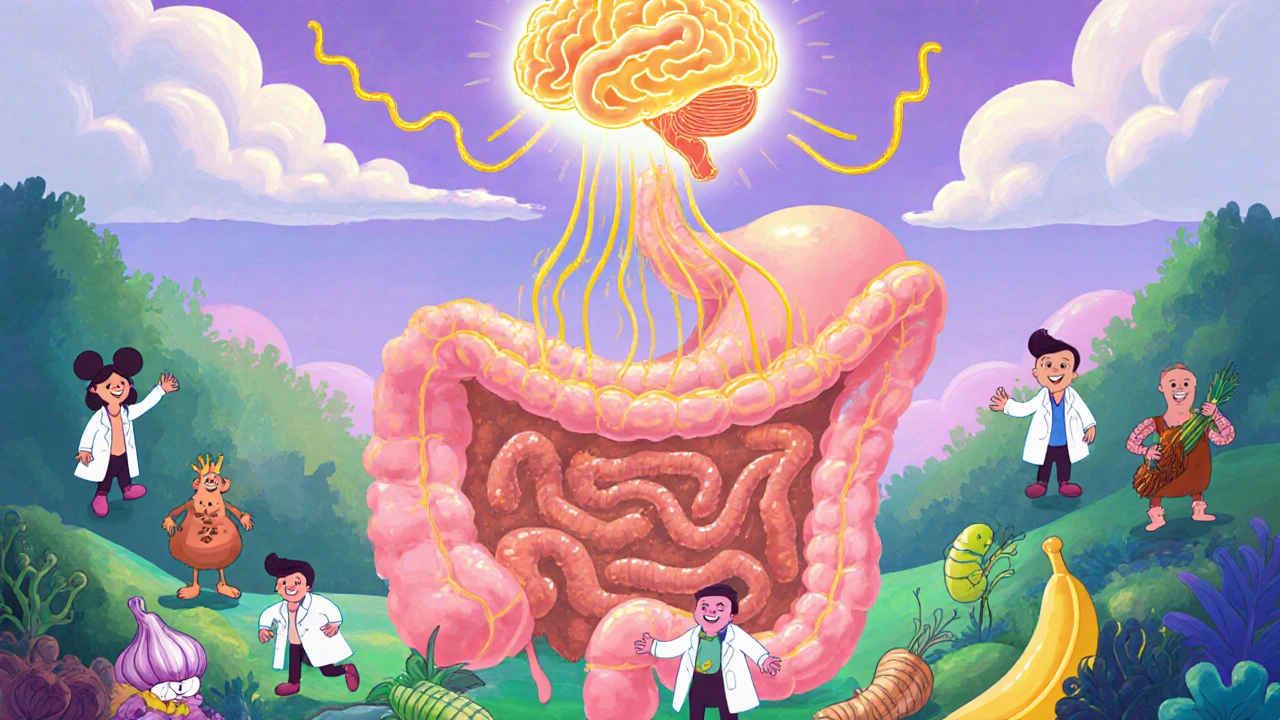What if the key to balancing your hormones isn’t a supplement, a pill, or even a change in your diet-but what’s growing in your gut right now? It sounds surprising, but your gut bacteria are quietly running the show when it comes to estrogen, cortisol, insulin, and even thyroid function. And prebiotics? They’re the fuel that makes those bacteria work.
How Your Gut Talks to Your Hormones
Your gut isn’t just a digestion machine. It’s a communication hub. Trillions of bacteria live there, and they don’t just break down food-they produce chemicals that talk directly to your brain, your adrenal glands, and your ovaries. One of the biggest players? The estrobolome. That’s the group of gut bacteria that helps regulate estrogen levels. When these bacteria are healthy, they break down excess estrogen and send it out through your stool. When they’re out of balance? Estrogen builds up. That can mean heavier periods, worse PMS, or even contribute to conditions like endometriosis and fibroids.
But it’s not just estrogen. Your gut bacteria also influence cortisol, your main stress hormone. When your gut lining is irritated-say, from too much sugar, processed food, or antibiotics-your body thinks it’s under attack. That triggers your adrenal glands to pump out more cortisol. High cortisol over time means weight gain around your middle, trouble sleeping, and brain fog. The fix? Feed the good bacteria. That’s where prebiotics come in.
What Are Prebiotics? (And How They’re Different from Probiotics)
People hear "probiotics" and think yogurt or supplements. But probiotics are the live bacteria themselves. Prebiotics? They’re the food those bacteria eat. Think of them like fertilizer for your gut garden. Without prebiotics, probiotics can’t survive long enough to do any good.
Prebiotics are a type of fiber your body can’t digest. Instead, they travel straight to your colon, where good bacteria like Bifidobacteria and Lactobacilli feast on them. This isn’t just theory. A 2023 study in the Journal of Clinical Endocrinology & Metabolism found that women who took 10 grams of inulin (a common prebiotic) daily for eight weeks had lower cortisol levels and improved estrogen metabolism compared to those who didn’t.
Common prebiotics include:
- Inulin (found in chicory root, Jerusalem artichokes)
- Fructooligosaccharides (FOS) (in onions, garlic, bananas)
- Galactooligosaccharides (GOS) (in legumes, dairy)
- Resistant starch (in cooked and cooled potatoes, green bananas)
These aren’t just "fiber"-they’re targeted fuel for the bacteria that help balance your hormones.
Prebiotics and Estrogen: The Estrobolome Explained
Estrogen isn’t just a female hormone-it’s needed by everyone. But too much or too little causes problems. In women, high estrogen can lead to weight gain, mood swings, and breast tenderness. In men, it can cause gynecomastia and low libido. The estrobolome controls how much estrogen gets recycled back into your bloodstream.
When your gut bacteria are healthy, they produce an enzyme called beta-glucuronidase that pulls estrogen out of your liver, packages it, and sends it to your colon to be eliminated. But if your gut is inflamed or your microbiome is imbalanced, this enzyme goes into overdrive. It pulls too much estrogen back into your blood. That’s when you start feeling the effects.
Research from the University of California showed that women with polycystic ovary syndrome (PCOS) had significantly lower levels of Bifidobacteria-the very bacteria that thrive on prebiotics. When they added 5 grams of prebiotic fiber daily, their estrogen levels normalized within six weeks, and their insulin resistance improved too.

Prebiotics and Cortisol: Breaking the Stress Cycle
Chronic stress doesn’t just make you feel anxious-it messes with your hormones at a cellular level. And your gut is ground zero. When stress hits, your body releases cortisol. That slows digestion, kills off good bacteria, and weakens your gut lining. Then, bad bacteria take over, which makes your gut leakier. That triggers inflammation, which tells your brain to release even more cortisol. It’s a loop.
Prebiotics break that cycle. In a 2024 clinical trial with 120 adults under high stress, those who took 8 grams of GOS daily for four weeks showed a 20% drop in cortisol levels by the end. They also reported better sleep, fewer cravings, and less brain fog. The reason? Prebiotics boosted Bifidobacteria, which produce short-chain fatty acids like butyrate. Butyrate doesn’t just feed your colon cells-it calms your nervous system and reduces inflammation in your brain.
How to Get More Prebiotics in Your Diet (Without Supplements)
You don’t need a fancy powder. Real food works better-and it’s cheaper. Start here:
- Throw 1-2 chopped garlic cloves into your stir-fries or salad dressings.
- Keep a bag of raw onions in the fridge. Add them to eggs, tacos, or sandwiches.
- Roast Jerusalem artichokes (sunchokes) like potatoes-they’re sweet and nutty.
- Cook a batch of brown rice or quinoa on Sunday, cool it in the fridge, and eat it cold in salads. Cooling turns starch into resistant starch.
- Snack on a green banana. It’s not as sweet, but it’s packed with prebiotic fiber.
- Try dandelion greens in salads. They’re bitter, but they’re one of the richest natural sources of inulin.
Start slow. Jumping from zero fiber to 15 grams of prebiotics overnight can cause bloating and gas. Increase by 1-2 grams every few days. Drink plenty of water. Your gut needs hydration to process fiber smoothly.

Who Should Be Careful With Prebiotics?
Most people benefit. But if you have SIBO (small intestinal bacterial overgrowth), IBS, or severe gut inflammation, prebiotics can make things worse. That’s because they feed bacteria in the wrong place. If you get bloated, gassy, or have pain after eating onions, garlic, or beans, don’t force it. Work with a functional medicine practitioner to test your gut first.
Also, if you’re on hormone therapy (like birth control or HRT), prebiotics can affect how your body processes those drugs. Talk to your doctor before making big dietary changes.
What to Expect in 4-8 Weeks
If you’re eating more prebiotic foods consistently, here’s what you might notice:
- Less bloating after meals
- More regular bowel movements
- Lighter, less painful periods
- Better sleep and less nighttime waking
- Fewer sugar cravings
- Clearer skin
These aren’t random changes. They’re signs your gut bacteria are finally getting the fuel they need to help your hormones work right again.
Prebiotics Aren’t a Quick Fix-But They’re One of the Most Powerful Tools You Have
There’s no magic pill for hormone balance. But there is a way to support your body’s own systems so they can heal themselves. Prebiotics don’t give you hormones. They help your body use the ones it already has, the way it’s meant to. And that’s not just healthy-it’s sustainable.
Start with one new prebiotic food this week. Add another next week. Watch how your body responds. Hormone balance isn’t about restriction. It’s about feeding the right things so your body can take care of the rest.
Can prebiotics help with weight gain caused by hormones?
Yes. Hormonal weight gain-especially around the belly-is often tied to high cortisol or estrogen dominance. Prebiotics help lower cortisol and improve estrogen metabolism, which reduces fat storage. A 2023 study found that women who added 10 grams of inulin daily lost an average of 1.8 pounds of belly fat over 12 weeks without changing anything else.
Do I need to take prebiotic supplements?
Not usually. Real food gives you a wider variety of fibers and nutrients than supplements. Most people get enough from garlic, onions, bananas, legumes, and cooled potatoes. Supplements can help if you’re not eating enough plants, but they’re not necessary for most.
How long does it take for prebiotics to balance hormones?
You might notice less bloating or better digestion in 1-2 weeks. Hormone-related changes-like improved PMS, sleep, or skin-usually show up between 4 and 8 weeks. Consistency matters more than dose.
Can men benefit from prebiotics for hormone balance?
Absolutely. Men need balanced estrogen too. Too much can lead to low testosterone symptoms-fatigue, low libido, mood swings. Prebiotics help clear excess estrogen and reduce inflammation, which supports healthy testosterone production. Studies show men with higher gut bacteria diversity have better hormone profiles.
What’s the best time of day to eat prebiotic foods?
There’s no magic time. Eat them with meals to help digestion. Some people prefer them in the morning to support bowel movements. Others like them at night to support overnight gut repair. The key is consistency, not timing.


Nawal Albakri
October 31, 2025
ok but what if the estrobolome is just a capitalist scam to sell you chicory root powder? i mean seriously who decided bacteria control hormones? maybe it’s the glyphosate in your coffee or the 5G towers syncing with your ovaries. i stopped eating garlic after my period turned into a dark ritual and my cat started staring at me like i’m the chosen one. the system doesn’t want you to know this. they’re scared.
Megan Oftedal
November 1, 2025
I find this article fascinating, though I’m a bit concerned about the lack of citations for the 2023 and 2024 studies mentioned. I’d love to see the DOI links or journal references-especially since some of the claims about cortisol reduction and estrogen metabolism seem quite strong. Also, I’m curious if the participants were all women, or if gender was factored in. Just a small note, but transparency builds trust.
Musa Aminu
November 3, 2025
Bro this is what happens when white people forget Africa invented medicine. We’ve been fermenting yams and plantains for centuries to balance hormones-no inulin needed. You think your garlic and onions are magic? Try ogiri or uziza seeds. Your body doesn’t need fancy science, it needs ancestral wisdom. And now you’re selling prebiotic powders like it’s a new Tesla? Wake up.
robert maisha
November 3, 2025
The gut endocrine axis is a complex system of bidirectional signaling mediated by microbial metabolites such as short chain fatty acids and neurotransmitter precursors. The estrobolome is not a formal taxonomic classification but a functional consortium. The implication that dietary fiber alone can modulate systemic hormone levels with clinical significance requires longitudinal randomized controlled trials with biomarker validation. I am not convinced by anecdotal correlation as causal evidence.
Alexander Ståhlberg
November 4, 2025
You think this is about garlic and bananas? No. This is about control. The pharmaceutical industry doesn’t want you to know your gut can fix what their pills can’t. They’ve spent billions making you believe you’re broken so you’ll keep buying. The estrobolome? It’s been known for decades. But you won’t hear about it on TV because there’s no patent on a potato. They want you dependent. They want you scared. They want you to keep swallowing capsules while your microbiome starves. This isn’t nutrition. It’s rebellion. And if you’re not eating cooled potatoes? You’re still part of the machine.
Robert Andersen
November 4, 2025
Man I tried adding inulin for a week and my gut went full warzone. Felt like a balloon with a party horn inside. But then I started with green bananas and just one clove of garlic a day. Slow and steady. Now I’m sleeping like a baby and my PMS is barely a whisper. I’m not saying it’s magic but it’s the first thing in years that actually felt like my body was working with me instead of against me.
Eric Donald
November 6, 2025
Thank you for including the caveats about SIBO and hormone therapy. Many articles skip this entirely, which can be dangerous. I’ve seen people with IBS worsen after following ‘gut health’ trends without testing. The advice to increase fiber gradually and stay hydrated is spot-on. Also, the point about men benefiting is important-hormone balance isn’t a women’s issue, it’s a human one. Well done.
Brenda Flores
November 6, 2025
This is so beautifully written. I’ve been eating roasted sunchokes every Sunday since reading this, and honestly? My skin has never looked better. I also noticed I don’t crave sugar anymore-like, at all. I’m not a ‘biohacker’ or anything, just someone who wants to feel like herself again. Thank you for reminding us that healing doesn’t always mean more pills-it can mean less stress, more onions, and a little patience. 🌱